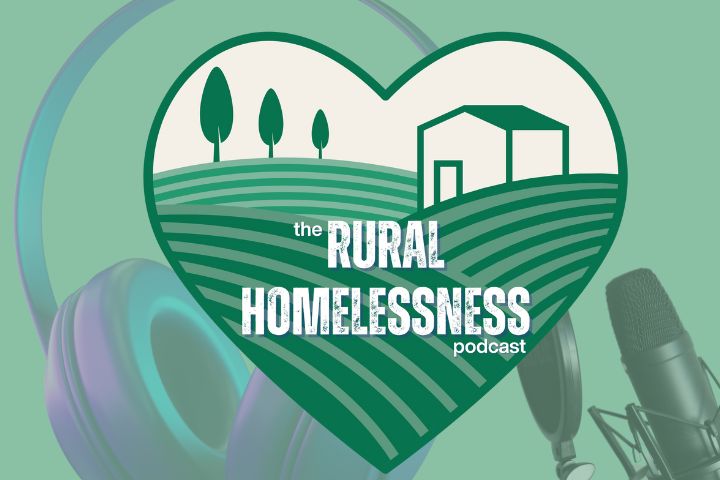➤
Back to News
15 January 2025
Rural Homelessness and Addiction: A Complex Relationship
In this episode of the Rural Homelessness Podcast, Ferry Project Hub manager John Heathorn and co-diagnosis practitioner Coryn Price join host Matt McChlery to discuss the relationship between homelessness and addiction. They explain how the causes of addictions will vary for different people: some become homeless because of addictions, whilst others develop addictions as a result of becoming homeless. Also discussed are the differences between rural and urban areas in terms of substance abuse, as well as how Ferry Project and other services support people who are addicted. Finally, the guests provide insight into the most important priorities for improving access to addiction services.
Transcript
Introduction
This is the Rural Homelessness Podcast, where we discuss the important issues around rural homelessness, hear from those affected by it, and offer some solutions. Brought to you by the award-winning homelessness charity, The Ferry Project. Welcome to the Rural Homelessness Podcast.
Matt McChlery (Host)
Hello and welcome to this edition of the Rural Homelessness Podcast. I am your host Matt McChlery. Thank you so much for joining me on this episode today. It really means a lot when you click over and join us for a conversation around the topic of rural homelessness. Now before we get into today's episode, I just wanted to quickly let you know that we now have a mailing list, and that you can sign up and it will notify you each time we publish a new episode of this podcast. If you want to join us, just click over to our website ferryproject.org.uk and go to the Contact Us page where you'll find a button you can click to sign up to our mailing list.
Now, onto today's show. I'm speaking with two guests who we have spoken to about other topics previously on the show and that is John Heathorn, who is the Night Services and Rough Sleeper Initiative Hub Manager from The Ferry Project, and also Coryn Price, who is a dual diagnosis practitioner and a community psychiatric nurse. Today we are discussing the topic of addiction and talking about how rural homelessness and addiction have a complex relationship. It's not as straightforward as we might think and the conversation sheds some light on this often misunderstood relationship between addiction and homelessness. So let's welcome John and Coryn to the show.
So let's welcome John and Coryn back to the show. You've both been on before in previous episodes. So hi John, welcome back.
John
Hi there Matt, hi Coryn.
Matt
Hi Coryn.
Coryn
Hello, nice to see you both.
Matt
Yeah, welcome back to the podcast. It's great to see you both again. Now today we're going to be talking about rural homelessness and addiction. Before we get down into the nitty-gritty of our discussion, let's just first of all, can you just tell us what your role is within the Ferry Project and who you are and kind of where you fit into what goes on?
John
Yeah, so I manage across everything from the outreach work at present, which is kind of helping out with the hub, which is the pathway to homelessness and homelessness prevention, and also the night provision that we provide, which then caters for the severe weather emergency provision we provide through the winter months to people that have not got accommodation.
Matt
Great, thanks. And Coryn?
Coryn
So I'm a community psychiatric nurse and I work with the Dual Diagnosis Street Project, which is a project set up alongside the Rough Sleepers Initiative, Fenland District Council and the Ferry Project kind of co-commissioned that way. So I work alongside John and the rest of the Project staff and try and support those who've got mental health issues, drug and alcohol issues and basically anybody who requires support from that perspective and do some long interventions with them and long-term work potentially if they're at the Ferry for a long time.
Matt
So Coryn, let's talk about the topic that we're looking at today which is homelessness and addiction. Now it seems to be a fairly obvious topic to address on the podcast because many people have a perception that all homeless people have an addiction problem of some kind. Is this true?
Coryn
I wouldn't say that it was a complete fact, but obviously the relationship between homelessness and substance abuse is a very strong relationship. And I think sometimes it kind of binds people together in that kind of life of uncertainty and instability. A lot of homeless people will clearly move towards the subculture to make them feel part of something. There's a clear association between dependents in amongst the time someone spends homeless. So if you look at that kind of relationship, I think we do see a lot of people who are homeless that do present with drug and alcohol issues. But I think that becomes more of an issue the longer time they're homeless. Because as soon as they get that stability, for instance, with the Ferry or they get some sort of form of accommodation, we do see that change and that shift. And essentially, I wouldn't say it's a complete link, a causal link, but I do think it presents more and becomes more prevalent because there is a subculture that develops, which makes it look like it's worse, if that makes sense.
Matt
That's interesting what you say. Have you seen this, John, with what you do, where the longer someone is homeless, the likelihood of them having an addiction issue is heightened?
John
So for me, you know, I've had addictions and that in the past, but they'd all most certainly been put to bed prior to me returning to the streets. Now in prison, heroin is commonly known as a bird killer, so by calling it a bird killer, it kills the time that you have to serve because it just takes away days and days and days, you lose days. So heroin is quite frequently used in order to just numb out the despair, the heartache and the pain and the uncertainty. And you find that on the streets. So, we find that people that are coming in and people that we're dealing with on the streets, their addictions are probably not their heist. And yet we see once you provide somewhere for someone that's safe and something that they can call their home, we often see, and I don't mean just often, it's quite common to see that that addiction will come down tenfold within at least the first six weeks.
Coryn
Absolutely. I agree with what John just said as well. I think going back to the prison system, we do find, we saw a big shift when the mandatory drug testing changed as part of sentence planning, a lot of offenders who were in custody would be subject to mandatory drug testing. And we all know that heroin use doesn't stay in the system as long as potentially cannabis use does. So there was a shift in the drug use and that spilled out onto the streets. So where you had your kind of standard alcohol users or somebody who smoked cannabis, because they'd got into that rhythm and that, as John said, that bird killer in jail, there was a shift in the substances which then spilled out to the streets. And yeah, I agree, totally agree on the prison aspect of it as well, which we do see a lot of people who've come from custody who are potentially homeless.
Matt
And you said, John, that within the first, how many weeks was it?
John
Within the first six weeks.
Matt
Within the first six weeks, you see a dramatic change in that. So, that means that the person was probably going to go through withdrawal and everything else whilst they are with you. What does that look like? How do you manage that? What support gets put in place to help someone who is probably going to go through withdrawal?
John
For us, the first assessment is very short. It's to assess their basic needs. Mental health follows hand in hand with those addictions regardless of whether you had mental health before, because I certainly didn't have mental health until I hit the streets and that trauma caused that mental health. Here at the Ferry, what we ask, the only thing we ask, is are you willing to engage? Okay, we're not going to judge on your drug or your alcohol use at point of entry, because at point of entry, if we did that, you'd all be too high risk and you'd all be too high support. We just ask that you want to change and you want to be given that opportunity to change. So the first thing we do is we wrap that support heavily around. They will be directed straight to CGL, one of our partners that we work closely with. Coryn will be immediately involved. And then we also get our local GP surgery involved to assess their physical health.
Coryn
I think with the Ferry, it's very seamless. Like John said, that the kind of initial assessment is to understand exactly what's required. It's not just about the addiction side of things, it's psychosocial, it's about financial aspects. I think when you ticked all those boxes that kind of feed into that sort of despair and that kind of feeling of going nowhere and not being able to move forward, once you start to wrap around and tick those boxes, the kind of substance misuse sort of fades into the background and becomes part of something else, so that they can manage that like John said with CGL, which is the local drug and alcohol services, and then the psychosocial interventions take place. So for instance, you'll start to work on their own self and you'll start to work on why they're using substances and what moving forward can be done to manage that not going back to where they were before. So I think that John said the wraparound is really important when someone comes off the streets and it's not just to say, right, you're on drugs or you're using alcohol. It's about looking at the holistic aspect of that person to make sure everything is done.
Matt
That's really interesting. So what other things might be looked at rather than just saying, well, you're addicted to this, you know, you need to stop or whatever. How does that work? The sort of the wraparound. I know it's different for each individual, so it's a bit tricky.
Coryn
It's very bespoke. I think that's what the Ferry is very good at is making the bespoke work. It's very client-centered I think because a lot of the work we do is trauma informed, a lot of people who've come through the service have had a history of trauma. So the trauma could have just been being homeless, but there's also other things that need to be managed as well. So like I said, going back to the psychosocial interventions, you're not just looking at that person's addiction, you're looking at it as a whole package. And that's really important to make it really client-centered and making sure that it's not a one-size-fits-all service. There's lots of different caveats to people's management.
Matt
What comes first? As we said, a higher percentage of homeless people, especially if they've been homeless for a certain length of time, usually have addiction issues. So what comes first, the addiction or the homelessness?
John
That's like the chicken and the egg question. Yeah, because people can lose their accommodation and find themselves homeless through addiction. You know, whether that be drugs, whether it be alcohol, whether it be gambling. And that then puts their, you know, their houses and their homes at risk, and then they find themselves on the streets. Or, you can find people go to the streets, and then start participating in the drugs. They may have started off on the streets on what we call a low-grade recreation drug such as cannabis. Crack-cocaine, you know, is prevalent, that is something that people are highly addicted to and it very quickly becomes addictive. So it's one of those where we see variation of people that have lost, you know, whether that be a relationship break down, whether that was an addiction that lost them their accommodation, go to the streets and then use drugs that they've never been known for using.
Coryn
From a dual diagnosis perspective, I think a lot of the time I get faced with the fact that people with mental health issues and substance misuse issues, they're subject to a lot of rejection due to the fact that like you just said, what comes first. A lot of people will use drugs or alcohol to manage that disparity, to manage the uncertainty of their lifestyle, the disconnection from their families. But then the addiction might have been there before. There's never a kind of a clear pathway for any certain person. A lot of people may use the gateway drugs as youngsters. It's about peer pressure, and then they start to form other peer group circles where they use different drugs. And then due to the fact they're in addiction, they may lose their property, they may lose their jobs. Their mental health might change due to the drugs. It changes for everybody. I don't think there's a set standard for whether or not it's what comes first. And I think the kind of co-occurring issues we have at the moment with people on the streets that come through the Ferry, the vast majority of them were professionals, they could have been in very, very good jobs, come from families where there was a real safe structure. And then all of a sudden that's gone, and they realize actually, do you know what? I can manage my lifestyle easier if I'm with a group of people that use drugs and take that pain away. So yeah, there's no set standard for what comes first. It's how we deal with it is the main priority.
Matt
Very good. Do you think addiction issues are more prevalent in rural areas compared to urban areas or is the pattern similar?
Coryn
I think, rurally it's more hidden. I think we've discussed this before, and I think it's more of a hidden harm. It's not as in your face. I don't think services are as accessible as they are in urban areas, so you tend to miss a cohort of service users that potentially might be hidden away. Urban areas do tend to have more accessible services that are easily located, easily accessed by trains, buses, whatever, walkable.
Matt
Sorry, does that change the type of drug people have access to or is it fairly widespread? Whatever drug is causing big issues sort of on the streets of London or Cambridge say is also doing a similar thing in rural areas such as Wisbech? Or is there a difference in that?
Coryn
I suppose it's what's accessible and I think, rurally, I think alcohol is more prevalent in rural areas because you've got a demographic that includes street drinkers and people who live in small collective areas. Research, I don't suppose there's that much research on the different kind of drugs that are used, but I know urban is more heroin and crack cocaine. But then that's starting to spill out now into more rural areas because obviously there's the shifts, the shifts in patterns of what drugs are actually highlight of the month, I suppose. I don't know if you see any differences, John, in terms of that?
John
Yeah, we see the pattern shifts and this all comes across from county lines. But from a drug dealer's perspective, the best customer to have would be crack cocaine. So if you can start bringing the heroin in quite cheap, heroin and crack cocaine go hand in hand. It's very unusual to find someone that only does one or the other, but it will start off with smoking crack cocaine. And people don't realize, because they're smoking it, how addictive it is. So cocaine has been known as a sex drug and rock and roll recreational party drug that many people back in the day have participated with.
Matt
You see it in lots of 80s movies, don't you? That kind of thing.
John
Yeah. And then all of a sudden, someone discovered that they could wash it up into a rock and it'd be smoked. And that was one of the worst things that happened. More addictive than any other drug, and there is no substitute for it. You cannot be medicated for crack cocaine. You cannot be given Subutex. You cannot be given methadone. It's one of those that are very difficult to stop once you've started.
Coryn
It's kind of on trend as well, isn't it. I think it's what's available and you do get, like John said, when county lines have been stopped, the drugs trend changes. In the 80s, early 90s, we had a real kind of prevalence of amphetamine use. And that went hand in hand with the injecting of amphetamines and the lack of understanding about bloodborne viruses. Then that changes into the heroin users because the amphetamine dries up. And it's very on trend as to what's kind of prevalent. But I think in terms of alcohol use, that probably was the most common among those who've been homeless for like over 10 years. I think some like 70% had used it within the last couple of weeks, whereas if you look at it in terms of heroin, it was much less. But then I do think when you start to develop a small culture of people who are potentially drinking, you will get other people coming, influencers coming in, say for instance, drug dealers and saying, maybe try this or then one person tries it and it becomes a pattern. And we do see that a lot, especially with the kind of the benefit circles almost. People becoming quite dependent on each other, as well as the drug.
Matt
What about this drug called Spice? I've heard a bit about this and that it’s affecting homeless people in certain areas. Have we seen much of that in our particular rural context or not really?
John
It started to come through at one stage, along with this monkey dust, but I think we've been quite lucky to avoid that. We've not seen it how other towns and cities have seen it.
Coryn
I think it was quite prevalent in the prison system, in the prison estates sort of early 2010, 2015, because it became harder for drugs to come into prisons. A lot of the prisons upped their security, there was a lot more input into management of drugs in prisons. And also it was non-detectable as well. So it was an easy drug to use without actually impacting on their sentence planning. I haven't seen it as much in the community, but I know it's more prevalent in cities. So for instance, if you've got in local prisons that kick out into the local community in the cities, you do see it more there. So kind of our neighboring cities like Peterborough, you will see it more, but it doesn't filter down as much to Wisbech because we haven't got the local jails and we haven't got the connections for things like that. It's not an easy drug to sell.
Matt
Hmm. That's interesting. Now, I was reading a book recently about a hotel, you know during COVID when everyone was brought in off the streets because of COVID and housed in hotels, and part of the story of this particular hotel that they were telling was this whole thing about the hoteliers who hadn't really had any experience with people with addictions before and drugs and things. And they would start to find drug paraphernalia and all that kind of stuff in people's rooms and things, and it was just about how they dealt with it, or didn't deal with it, or maybe should have done it in a different way. What does Ferry do? What's the standpoint on drug use within the homeless hostel at Ferry when it comes to that sort of thing? Is it something that you just go, oh well, they're homeless. They're trying to quit. So, you know, we give them a pass. Or how does it work? What does it look like?
John
We have zero tolerance for drugs and alcohol on site. We are sympathetic to those that are still using and just ask that if that happens, it happens off site in a controlled way. We do come across a lot of drug paraphernalia and that can be anything from what we would consider roles of tin foil in rooms, which would suggest some kind of smoking of heroin or crack cocaine, to grinders. Now depending on the level of risk to others, including staff, would be determining the conversation or the action taken. Hence if we went into a room and there was uncapped needles that had clearly been set up and had blood in them and heroin in them, and they were putting staff at risk, because we all know the consequences of being pricked by one of those needles, the uncertainty of what you may have contracted for the next six months will turn your life upside down and inside out. So, it always depends on what we find and where that conversation is to be had first.
Matt
And what is the success rate of helping people to overcome their addiction issues at Ferry Project?
John
Again, the total number of people that have abstained from drug and alcohol use is probably something that we don't keep, because our partners who specialize in drug and alcohol would keep those. What I can tell you is, although we may not get someone to abstain from drugs and alcohol, it's about getting them to the best version of themselves, where they are functioning, and when I say functioning I mean being able to take the responsibility of your bills, your payments, your house and getting your priorities straight. And then the addiction behind that, at the level that's safe for them. So it's all about harm minimization and making that person… it's not for us to tell someone that they should never drink again or they should never do this again. However, if it poses a risk to themselves or others within our hostel, that's the only time that they'll put their tenancy at risk.
Coryn
I think also when you look at abstinence, I think that's not a kind of finite thing. I think we look at recovery as well. It's about somebody's recovery journey. If somebody's going through a homeless period and they're in addiction, the change, like John said, making somebody a better version of themselves, the change that they go through and the recovery journey they go through is in itself the next step towards managing their addiction. So I think it's not necessarily about abstaining, it's more about management and risk management and minimizing the harm to themselves and others, and understanding why they're in addiction and getting more of an understanding of where this comes from. And I think that’s the main priority here for me, it’s looking back into somebody's life and figuring out where things changed and where things went wrong. But I think for instance, with the drug and alcohol services, they'll use the recovery agenda as well. Rather than people saying, right, you need to be off drugs or off alcohol. If somebody's in alcohol addiction and they shift to controlled drinking, that in itself is almost as good as abstinence in terms of management of their health. So yeah, I think abstinence for me is not the main agenda. It's more about their recovery and what they've done along the way to manage that and understand themselves and their trauma history.
Matt
Thank you. What can be done to help improve access to services that help people overcome addiction in rural areas?
Coryn
I think it is about consistency, about continually providing something to people and not having to have things taken away, for instance, through funding streams and things like that, and not having that constant battle to kind of maintain a service. That clearly works very well. So for me, the main priority is continuing that care and making it a beacon of hope for people so that people will always know that something's there to offer support. And that's the priority for me and for access to services: maintaining something that works and keeping it there.
John
And the shorter the accessibility, the better, because we're always watching. So although we are surrounded by people that, there is no doubt in my mind, they need some help from someone somewhere, are they ready for it? That's what we're waiting for. That's what we're looking for. And when they are, we need to access them services as quick as possible whilst they're in that engagement mode. Because you leave it too long, you'll just lose them. You'll just lose them because they'll just think that they've been messed around or it was a waste of time. They've asked for the help, it's not happening. So resources would obviously help that to make these accessible quicker than they are now.
Coryn
I think also as well, like quite rightly John said, you're feeding into that pathology of a life long time of rejection at some point. If somebody can't access something immediately and things don't go well, you're almost feeding into what they believe in about themselves, that they're not worthy or they don't deserve that help. I think like John said, that kind of really quick accessibility and not losing somebody while they're in that phase of recovery is really really important.
Matt
No, really good points. Thank you. Thank you. Yes, it's been a very interesting discussion about addictions and homelessness and how it kind of, interrelates and works, and what you guys do to help those trying to recover from that. So thank you. Thank you, John and Coryn for joining us today on this episode of the Rural Homelessness Podcast.
Coryn
Thank you very much.
John
Thank you very much.
Matt
And thank you as well for listening to this episode. And don't forget that the Rural Homelessness podcast comes out twice a month on the 1st and the 15th. So I'll be back really soon discussing another important topic around the issue of rural homelessness, and I look forward to having the pleasure of your company again really soon. Thank you and goodbye.
Outro
Thank you for listening to the Rural Homelessness Podcast brought to you by The Ferry Project. Visit our website on www.ferryproject.org.uk.






